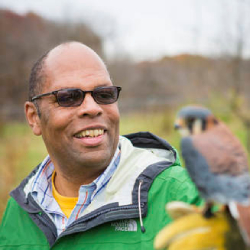2022 Candidate Charles Nilon
 Charles Nilon
Charles Nilon
Professor
University of Missouri
Candidate for: Member of the Governing Board
I started out as a biology major and wanting to go to medical school. Through some volunteer experiences when I was at home in the summer I decided I wanted to go into wildlife management. This led to two paid summer research experiences and a masters degree in wildlife ecology. I worked for two years as a biologist for a state conservation agency then returned to graduate school for a PhD in ecology. After a year teaching general biology I spent two years working as a research biologist for a different state conservation agency. Since 1989 I’ve been a faculty member in the University of Missouri’s School of Natural Resources.
I attended my first ESA meeting in 1986 and did not attend again until 1997. However I joined ESA in 1990 because a colleague encouraged me to join. A few years later I became a member of the Education and Human Resources Committee. Through this committee I became involved with a number of efforts to diversity ESA. I’ve had the opportunity to serve the society as chair of the Education Section, chair of the Environmental Justice Section, and as a member of the original SEEDS Advisory Committee. Recently I’ve been chair of the Historical Records Committee, and chair of the Awards Committee.
What interests, experience or skills would you bring to this position?
I’m a wildlife ecologist focusing on urban wildlife conservation, urban ecology, and the human dimensions of natural resources. Wildlife ecology is an applied discipline so I’ve worked with land managers, officials with state and local governments, urban and suburban residents, and members of community groups to address management and conservation question in cities and neighborhoods.
I’m a teacher with 33 years of teaching and mentoring undergraduate and graduate students. How and what ecologists teach has changed and who we teach is changing slowly. I’m active in working to make ecology a more diverse, inclusive, and just discipline by working to make how we teach more inclusive. During the past 15 years I’ve been a CoPI on and undergraduate research program that targeted minoritized students, a CoPI on an inclusive excellence grant focusing on transforming how STEM courses are taught, and a PI on a training grant targeting minoritized students in forest resource management.
How would you support ESA’s mission? How would you plan to promote DEIJ in ESA membership and activities if elected?
ESA’s governing board helps to develop a vision for implementing ESA mission. A key part of this mission is to serve the needs of ESA members, and to promote the discipline of ecology to the public and to policy makers. I will advocate for policies and practices that connect and engage all members of ESA, but also that link ecologists more directly to people and communities. ESA has the ability to reach members in new ways and to be visible to the communities where members study, work, and live.
ESA members are already engaged in DEIJ activities. Leaders of the the Black Ecologists, Traditional Ecological Knowledge, Inclusive Ecology, Environmental Justice, Human Ecology, and Early Career Ecologists, and other sections are actively engaged in efforts to transform ESA. I would advocate for the work of these sections and to make their work more visible within ESA. I will also advocate for continuing collaborations between ESA and other professional societies such as the recent efforts to meet with the staff of SACNAS and MANRRS, and for ESA to be visible at the meetings of those organizations.